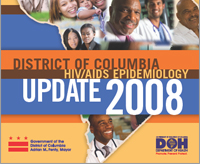By Eric Sawyer, veteran AIDS activists and cofounder of Housing Works.
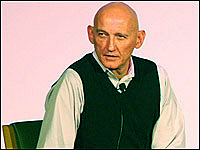
appeared at a screening of Outrage at the Tribeca Film Festival in New York in May 2009.
Credit: Getty Images/Andrew H. Walker
This week, I got the unexpected news that my friend, the legendary AIDS activist Rodger McFarlane had taken his own life. I was in shock and deeply saddened.
Roger was a terrific friend, not only to me as an individual and countless others around the world but a terrific friend to the LGBT (lesbian, gay, bisexual and transgender) and HIV communities as well. Rodger was a co-founder of ACT UP New York. He was a mentor to countless activists and employees at numerous AIDS organizations and a critical supporter, both intellectually and financially of advocacy for gay and lesbian and HIV causes. Rodger was a hero!
Rodger was critical to the development of many of the largest and most effective organizations that would lead the fight against AIDS. He started the first AIDS hot line on his own home phone; he was the first executive director of GMHC (Gay Men’s Health Crisis) and Broadway Cares/Equity Fights AIDS (he combined the two organizations). Rodger was also the President of Bailey House and later the executive director of the Gill Foundation.
An accomplished athlete, Rodger had no physical fear and his quick mind made him a brilliant strategic activist; Rodger always could construct a plan to rectify any problem and was able to find the clever media hook to draw public attention to the problem. He never reacted with anger and haste. He preferred a planned response, crafted with a cool hand. He was insightful, never flustered and always had a “we can lick this approach” to overcoming any challenge.
“Tell me what's going on," would be followed by, "That outrageous!" and then, "Here's how we fix this thing." He would then ask "What do you think?" He was always ready to hear suggestions to refine his ideas.
Rodger takes on Guantanamo Bay
When ACT UP and others were fighting to close the HIV detention camp at Guantanamo Bay, I went to Rodger and asked for help planning a high profile press event and civil disobedience action. Again it was: "Tell me what's going on, -that's outrageous!” followed by, “Let's kick their motherf***ing asses!" and, "Here's what we do..."
And here is what he did: Rodger hired young ACT UP member and fledging producer David Binder (now a Tony nominee for “33 Variations”) to produce a rally and press conference at Rockefeller Center near the immigration programs passport office. We managed to get Dennis DeLeon (then the New York City Commissioner of Human Rights), Jessie Jackson, Susan Sarandon and director Jonathan Demme and other high-profile AIDS community members involved in a coalition planning effort, and before we knew it, 40 boldfaced names had been arrested on Fifth Avenue for blocking traffic while demanding medical parole for the sickest and the closing of the camp.
Jessie and Rodger insisted that we all go through the system and stay over night in jail to keep the TV cameras on the issue. They both agreed it would have optimal benefit to keep our issue in the media for as long as possible.
Within a few hours Mayor Dinkins was dispatched to the jail, at US President Clinton's request, to talk Jessie and the rest of us into a quick quiet release. He did not want negative attention about what was becoming an increasing public black eye to his fledgling Presidency.
Jessie was told that the Clinton Administration would look favorably on our demands if we took desk appearance tickets and left jail quickly to turn the press heat off. We were warned that to stay in jail over night would have a less favorable response. Jessie said that David had asked him personally as well, as a good Democrat, to leave with him right away.
We caucused and decided that we were likely to get some of our demands met if we left, ultimately helping the HIV-positive detainees in Guantanamo. We felt that while this war was not over, the battle had been won; we had Bill Clinton dispatching Mayor Dinkins to respond to our actions. We took the desk appearance tickets and left the holding cells. Shortly thereafter all the pregnant women and people with a full-blown AIDS diagnosis were released from the Guantanamo HIV detention camp—the same camp where the terrorist are being held today.
Thank you Rodger, for all you did. Rest peacefully our fearless warrior!
Eric Sawyer is a veteran AIDS activists and cofounder of Housing Works.




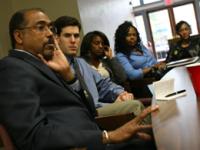


 (L to R): Krista Lauer, AIDS Project Los Angeles, Dr Cheikh E. Traoré, Sexual Diversity, UNDP Senior Advisor, Tudor Kovacs, Population Services International, Romania, Ambassador Eric Goosby, U.S. Global AIDS Coordinator and UNAIDS Executive Director Michel Sidibé.
(L to R): Krista Lauer, AIDS Project Los Angeles, Dr Cheikh E. Traoré, Sexual Diversity, UNDP Senior Advisor, Tudor Kovacs, Population Services International, Romania, Ambassador Eric Goosby, U.S. Global AIDS Coordinator and UNAIDS Executive Director Michel Sidibé. 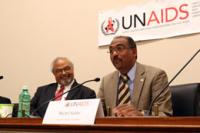 Ambassador Eric Goosby, U.S. Global AIDS Coordinator and UNAIDS Executive Director Michel Sidibé during the UNAIDS Forum on HIV, Human Rights and Men Who Have Sex with Men. Washington, September 16, 2009.
Ambassador Eric Goosby, U.S. Global AIDS Coordinator and UNAIDS Executive Director Michel Sidibé during the UNAIDS Forum on HIV, Human Rights and Men Who Have Sex with Men. Washington, September 16, 2009. 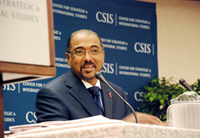
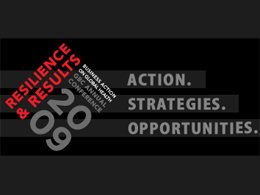
 appeared at a screening of Outrage at the Tribeca Film Festival in New York in May 2009.
appeared at a screening of Outrage at the Tribeca Film Festival in New York in May 2009. 
